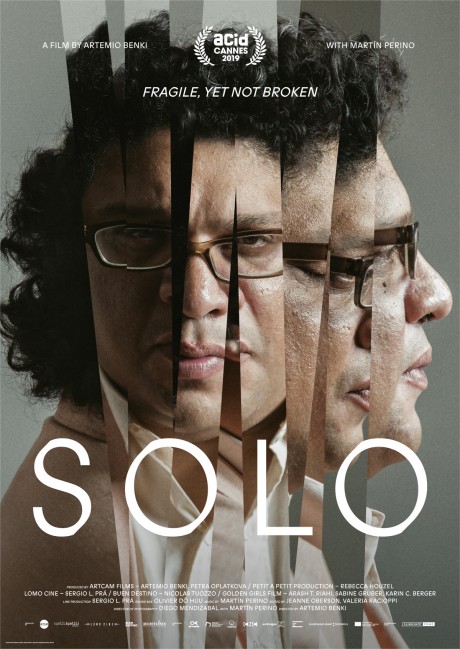


Artemio Benki: Solo

Towards the end of the film, Martìn Perino is in a school class with his friend, the dancer Solé. He talks to the students: ”Solé and I would like you to write down, what you feel or think, when you listen to the music, I am going to play. Please put your words down on a piece of paper”.
They do so. Now it is my turn to put down, what I feel and think after having watched ”Solo” – for the second time. I feel that I have been given the gift of getting very close to a man with an extraordinary musical talent. For playing and composing. A very generous move from a fragile man, who spent 3 years at el Borda, the psychiatric hospital in Buenos Aires, gets out from there but is still under treatment. He lets me suffer with him, be happy and enjoy, when he is at the piano. And a very – towards him – respectful and compassionate
move from the filmmakers to convey, what they got from Martìn Perino. There is energy in every scene, you are invited to follow the ups and downs of the pianist, you often have the same tense feeling as he has, when he is fighting for the freedom, that he fears. Chain-smoking and if his hands do not carry a cigarette, they are searching for a piano to play on. Classical pieces or his own compositions.
The construction of the film is excellent. The opening tells the viewer, where we are: El Borda, where the patients are fragile and where Perino is playing the composition that he has made for the hospital, its personnel and patients. Enfermaria, he calls it. And then, step by step, you get to know Martìn Perino. Often through conversations or situations with friends at the hospital, like Luis, who says “with your music you can tell your whole story”. Perino, no let me call him by first name as I think I now know him so well, Martìn tells at a lunch scene that at a moment, he was so scared to be alone in the streets that he had to ask Luis for support. The charismatic therapist has through the film several conversations with Martìn, scenes full of atmosphere, both when they take place in the hospital or at the home, where Martìn lives after being released from Borda. A messy place, the home, it was before the place of his parents, and Martìn has obviously problems in coping with making it orderly. Or he does not care. He visits his former teacher, giving her his story about “all that happened in my head”… and then the music “started from my chaos… I didn´t suffer in vain!”. He has a lot of humour at the same time as he is desperate to get permission to play. Or to get to a piano. It is “a psychological urge”.
He walks the streets of my wonderful Buenos Aires – my father was born there, could not help thinking about it when watching and I write these words with tears in my eyes… – as I had so many times through “Solo”. You can have tears, when you feel sadness but also when you watch and listen to the music of a great pianist like Martìn. And – thanks for holding back that aspect – there was a mother, who thought Martìn was a genius… As he says to the therapist, “I have to get rid of the genius”. Nevertheless, when he plays for the bourgeoisie of BA: “My mother was a pianist and when she was very ill, I played her favourite piece for her, Alberto Gianestra´s “Dance of the Beautiful Maiden”. And he does that in the film. Formidable!
As is the film by Artemio Benki… and the camera work of Diego Mendizabal. The pain, the suffering, the joy, the introvert side of Martìn. Through many close ups. Did not know the dop, checked his filmography, he has quite a track record. Thank you first of all to Martìn Perino for letting me into your life.
2019, Czech Republic, France, Argentina, Austria, 84 mins.